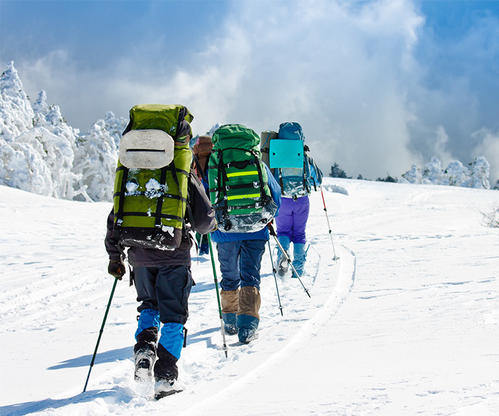Climbing consumes about 500 kcal of energy
Rock climbing, mountain climbing is aerobic exercise, can make the blood protein increase, increase the number of immune cells, enhance immunity, help the body's carcinogens, harmful substances, toxins, etc. out of the body in time. Promote metabolism at the same time, speed up fat consumption, so mountain climbing also has the effect of slimming.
Studies have confirmed that a person weighing 70 kg consumes about 500 kcal of energy if he climbs a 70 degree slope for 30 minutes at a speed of 2 km per hour. It's equivalent to swimming for 45 minutes at a speed of 50 meters per minute, or running continuously for 50 minutes at a speed of 8 kilometers per hour on a treadmill.
The best time to lose weight by mountain climbing
Many people like to climb mountains in the morning and think the air is the freshest in the morning. But in fact, 4 am to 10 am is the period of blood viscosity. If the climber does not have the habit of early exercise, and has a history of hyperlipidemia, blood viscosity, diabetes, high blood pressure or myocardial infarction, he chooses to climb in the morning. If the intensity is higher, it may induce myocardial infarction or cerebral infarction.
Therefore, after 3 p.m. climbing is the best, but also pay attention not to forget to bring a bottle of light salt water, timely supplement water, in order to avoid excessive sweating, resulting in dehydration.
Precautions for weight loss in mountain climbing
1. Full preparation
Climbing mountains takes a lot of energy. For those who don't often climb mountains, they must do some preparatory activities before climbing. This is very necessary, absolutely not less! Before climbing, remember to spend about 10 minutes warming up and moving your joints to avoid injury.
2. Breathable clothes and sneakers
Climbing mountains is bound to sweat. It's necessary to change into breathable T-shirts and shorts. Of course, a pair of sports shoes also need to be prepared, especially in the morning, there may be fog on the mountain, there may be water drops on the steps, sports shoes can be wear-resistant and anti slip.
3. Drink water before you are thirsty
Pay attention to supplement water during exercise, drink more water on the basis of meeting thirst, or drink 400-600 ml 10-15 minutes before exercise, so as to reduce the degree of water shortage during exercise. The beverage should contain appropriate sugar and electrolysis degree (and preferably vitamin C) to reduce fatigue and restore physical strength as soon as possible.
4. The intensity of mountain climbing should not be too high. The heart rate should be kept at 120-140 times / min. generally, it is appropriate to exercise 3-4 times a week.
5. Don't climb the steps too fast
After all, mountain climbing is a sport, which is used to exercise. Therefore, mountain climbing is not to show off. When climbing the steps, don't be too fast. You should not only pay attention to the steps at your feet, but also pay attention to the direction in front of you.
6. Try to step up the steps
Mountain climbing is a very physical activity. For people who are a little bit obese, mountain climbing is very helpful to reduce the fat of legs and waist. When stepping, move slowly and steadily. So the effect of exercise is obvious.
7. Try to jump up the steps
Jumping up the steps is a very physical exercise. Of course, there are many advantages here, especially for people with a lot of abdominal fat. In the long run, it is conducive to reducing the accumulation of abdominal fat, and a good figure will come out naturally. Next time you climb a mountain, if you come across a step that is not very steep, try to jump up!
8. Run around the mountain road
At present, some mountain runways have been opened. The air on the mountain is fresh, the environment is elegant and green. Take your step and run around the mountain road happily. You will sweat all over and feel comfortable. If you have plenty of physical strength, you must try, otherwise, you will lose your happiness when you climb the mountain in the morning!
9. Vitamin "heat supplement"
Due to the large consumption of energy and various nutrients during mountain climbing, the supply of vitamins is indispensable. In particular, we should pay attention to supplement appropriate amount of vitamin A, vitamin B and vitamin D every day. In addition, food should be easy to digest, eat less crude fiber and gas producing food (celery, leek, soybean, etc.), eat more alkaline food, vegetables, fruits, kelp, etc.
10. When going up the mountain, it's best to lean forward in order to save effort; when going down the mountain, it's best to walk in a zigzag shape to reduce the impact of the knee joint.
11. Remember to relax
After climbing to the top of the mountain, remember to learn to do some body stretching exercise. It is necessary to move your hands and feet, neck and waist. When you go down the mountain, you should also do some hand and foot movements, which is conducive to buffering the body's fatigue after exercise.










